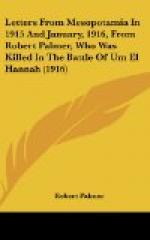As for the country, it is said to be very fertile wherever properly irrigated. At present the water is distributed about as badly as it could be. The annual rise of the river makes vast feverish swamps, and the rest of the country is waterless. Any stray Bedouin tribe that feels like growing a crop can go and cut a hole in the bank and irrigate a patch for one season and then leave it; and these cuts form new channels which as often as not lose themselves in a swamp. Meanwhile this haphazard draining off of the water is seriously impairing the main streams, especially that of the Euphrates, which is now almost unnavigable in the low water season. To develop the country therefore means (1) a comprehensive irrigation and drainage scheme. Willcock’s scheme I believe is only for irrigation. I don’t know how much the extreme flatness of the country would hamper such a scheme. Here we are 200 miles by river from the sea and only 28ft. above sea-level. It follows (2) that we must control the country and the nomad tribes from the highest barrage continuously down to the sea. (3) We must have security that the Turks don’t interfere with the rivers above our barrage, or even neglect the river banks.
All this seems to me to point to a repetition of our Egyptian experience. We shall be drawn, whether we like it or not, into a virtual protectorate at least as far up as the line Kut-Nasiryah, along the Shatt-al-Hai, and that will have to extend laterally on the east to the Persian frontier and on the west to the Arabian tableland. I don’t see how we can hope to get off with less: and that being so, I believe it would be better to take on the whole at once. North of the Shatt-al-Hai line (i.e. Kut-Nasiryah) it would be very exhausting to go, and very awkward politically, as you soon get among the holy places of the Shiahs, especially Karbala, which is their Mecca. But it’s no use blinking the fact that a river is a continuous whole, and experience shows that the power which controls the mouth is sooner or later forced to climb to its source, especially when its up-stream neighbours are hostile and not civilised. And what power of Government will be left to Turkey after the war? It looks as if she will be as bankrupt, both financially and politically, as Persia; and I see no real hope of avoiding a partition a la Persia into British and Russian spheres of interest. In that case it seems to me the British sphere should go to the Shatt-al-Hai, and the Russian begin where the plain ends, or at any rate north of Mosul. Are you at liberty to tell me whether there is already an understanding with Russia about this country, and if so how far it goes?




